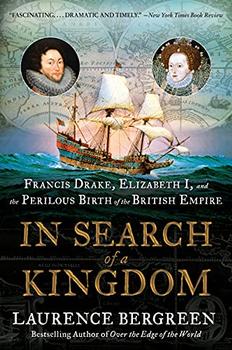Summary | Excerpt | Reviews | Beyond the book | Read-Alikes | Genres & Themes | Author Bio

The Making of America by England's Merchant Adventurers
by John Butman, Simon TargettWhen we think about the founding of America, we typically envision Pilgrims in black garb and boxy hats, sailing bravely to an untouched landscape where they could worship free from persecution. Yet as John Butman and Simon Targett show in New World, Inc., the Pilgrims were far from being trailblazing colonists. The authors bring to life forgotten and overlooked explorers and they demonstrate that profit, not religious freedom, acted as the driving force for colonization.
The authors begin by describing England in the mid-sixteenth century—politically unstable, experiencing extreme inequalities of wealth, and suffering from economic setbacks. In particular, the woolen cloth trade that had been the country's lifeblood was threatened by England's loss of Calais. The port town of Calais in the north of France had been England's trading entrepôt with the continent from 1347 when King Edward III captured it, up until January 1558 when the French retook it.
When Queen Mary of England died later that year, Elizabeth I ascended to the throne of a country in dire need of new markets for its cloth trade, and with Spain as a powerful political rival. Spain was far stronger economically than England, in large part due to its established colonies in the Americas from which the country extracted silver and other commodities.
It was in this environment that a colorful cast of characters, including sailors, intellectuals, and merchants, started devising ways that the English could also make money from the New World. Far from envisioning colonies, these early investors and adventurers sought the Northwest Passage—the fabled sea route to China through the Arctic. This would give English merchants access to eastern markets for their woolen cloth.
As the authors explain, this goal drove explorers including Martin Frobisher and Sir Humphrey Gilbert, men whose names are largely lost to history, to explore the upper reaches of North America with the hope of navigating a direct sea route to China. Unfortunately, most of these excursions failed spectacularly and left investors with nothing to show for the voyages they sponsored.
Yet English merchants and sailors persevered. New World Inc. reaches deep into the historical record to bring each voyage, and the economic reasoning behind it, into full view with impressive detail. As merchant companies realized the Northwest Passage couldn't easily be found, they turned their attention to more tangible commodities such as timber and furs from northern America, and sassafras bark from the southern coast of the territory they named Virginia, in honor of Elizabeth, the "Virgin Queen" (see 'Beyond the Book'). It was the search for these commodities that inspired the first English settlement of America.
The authors describe the many misadventures of those who sought to establish trading posts. They detail the attempts to settle Roanoke in the 1580s and the mysterious disappearance of the settlers, as well as a failed colony at Sagadahoc in present-day Maine in 1608. They recount the struggle for survival at Jamestown, founded in 1607, where dysentery, starvation, and social unrest nearly ended the English settlement.
New World Inc. succeeds at presenting Native Americans as integral members of these stories, from cautious allies of the newcomers, to victims of violent kidnappings by Englishmen who displayed them back at court as curiosities. Yet the Spanish and French who had already established their presence to the South and North, respectively, are given relatively little attention.
It was only after these many explorations that the Pilgrims set sail in the Mayflower in 1620, and they too struggled to survive. The authors point out that the story of the first Thanksgiving, a relatively random episode in all the attempts by the English to settle in the New World, became a national fixation during the Civil War. This historical event "could bring together disparate groups, including those of different religions, as well as city dwellers and country folk, under an umbrella of shared nationhood." New World Inc. makes a polite yet convincing case that, despite the pervasiveness of the Pilgrims' story, it was the desire for lucrative trade that drove the founding of America.
With a conversational tone the authors move through the political and economic intricacies of Elizabethan England, and they bring a much-needed perspective to the accepted mythology around America's founding. It may not line up with exactly what we were taught as schoolchildren, but it's a story about people seeking prosperity—American through and through.
![]() This review
first ran in the May 16, 2018
issue of BookBrowse Recommends.
This review
first ran in the May 16, 2018
issue of BookBrowse Recommends.

If you liked New World, Inc., try these:

by Greg Grandin
Published 2025
From the Pulitzer Prize–winning historian, the first comprehensive history of the Western Hemisphere, a sweeping five-century narrative of North and South America that redefines our understanding of both.

by Laurence Bergreen
Published 2022
In this grand and thrilling narrative, the acclaimed biographer of Magellan, Columbus, and Marco Polo brings alive the singular life and adventures of Sir Francis Drake, the pirate/explorer/admiral whose mastery of the seas during the reign of Queen Elizabeth I changed the course of history.
Your guide toexceptional books
BookBrowse seeks out and recommends the best in contemporary fiction and nonfiction—books that not only engage and entertain but also deepen our understanding of ourselves and the world around us.